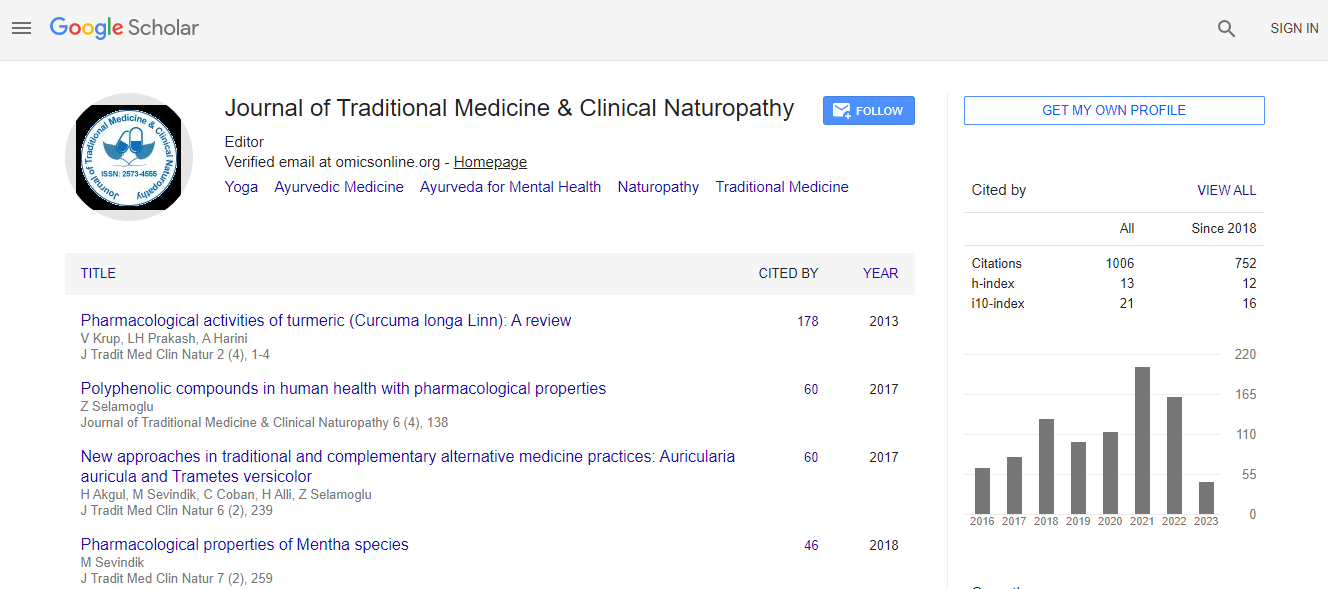Review Article
Prospective Role of Indian Medicinal Plants in Inhibiting Vascular Endothelial Growth Factor (VEGF) mediated Pathological Angiogenesis
| Mahapatra Arun Kumar1*, Nisha Kumari Ojha2 and Abhimanyu Kumar3 | |
| 1Senior Research Fellow, P.G. Department of Ay.Pediatrics (Kaumarbhritya), National institute of Ayurveda, Jaipur-302002, Rajasthan, India | |
| 2Lecturer, P.G. Department of Ay.Pediatrics (Kaumarbhritya), National institute of Ayurveda, Jaipur-302002, Rajasthan, India | |
| 3Director, All India Institute of Ayurveda, Saritavihar, New Delhi, India | |
| Corresponding Author : | Dr. Mahapatra Arun Kumar Senior Research Fellow P.G. Department of Ay. Pediatrics (Kaumarbhritya) National institute of Ayurveda Jaipur-302002, Rajasthan, India E-mail: ayuarun@gmail.com |
| Received April 15, 2013; Accepted May 20, 2013; Published May 27, 2013 | |
| Citation: Arun Kumar M, Nisha Kumari O, Abhimanyu Kumar (2013) Prospective Role of Indian Medicinal Plants in Inhibiting Vascular Endothelial Growth Factor (VEGF) mediated Pathological Angiogenesis. J Homeop Ayurv Med 2:121. doi: 10.4172/2167-1206.1000121 | |
| Copyright: © 2013 Arun Kumar M, et al. This is an open-access article distributed under the terms of the Creative Commons Attribution License, which permits unrestricted use, distribution, and reproduction in any medium, provided the original author and source are credited. | |
Abstract
Vascular Endothelial Growth Factor (VEGF) plays an important role in physiological as well as pathological angiogenesis. Physiologically, VEGF is essential for embryonic vasculogenesis, endochondral ossification, neovascularisation following injury and collateral circulation to bypass blocked vessels. Solid neoplasms need adequate blood supply to grow in size. Thus, Neoplasm cells over-express VEGF and promote pathological angiogenesis. By virtue of various mechanisms including release of VEGF, the cancer cells grow and metastasize. VEGF also acts as survival factor for endothelial cells and tumor cells and protect them from apoptosis. Drugs which inhibit VEGF can control or slow down the disease process associated with VEGF mediated pathological angiogenesis. VEGF inhibitors
from plant sources are matter of great interest in recent times. It was evident from the present study, that Indian medicinal plant like, Tinosporacordifolia, Ocimum sanctum, Azadirachtaindica, Calotropisprocera, Withaniasomnifera, Curcuma longa, Commiphoramukul, Piper longum, Andrographispaniculata, Peganumharmala, Vernoniacinerea, Boswelliaserrata described in ancient texts of Ayurvedainhibits VEGF mediated pathological angiogenesis. Anti-VEGF agent from natural sources may complement the efficacy of chemotherapy and radiotherapy without much toxicity.

 Spanish
Spanish  Chinese
Chinese  Russian
Russian  German
German  French
French  Japanese
Japanese  Portuguese
Portuguese  Hindi
Hindi 
